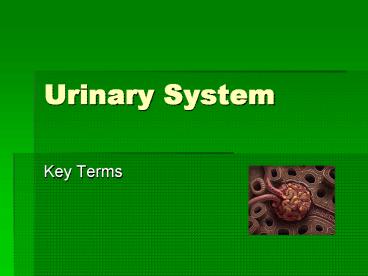Urinary System PowerPoint PPT Presentation
1 / 29
Title: Urinary System
1
Urinary System
- Key Terms
2
Anasarca
- an??-sahrk?
- Dropsy of the subcutaneous cellular tissue an
effusion of serum into the cellular substance,
occasioning a soft, pale, inelastic swelling of
the skin.
3
Azotemia
- az?o-teme-?
- An excess of nitrogenous waste products in the
blood.
4
Cachectic
- kah-kektik
- Pertaining to or characterized by cachexia.
cachexia (k?-kekse-?) a profound and marked
state of constitutional disorder general ill
health and malnutrition.
5
Calculus(i)
- kalku-l?s
- pl. calculi an abnormal concretion in the body,
usually composed of mineral salts the usual
location is in a hollow organ or passage. Called
also stone.
6
Cystitis
- sis-titis
- inflammation of the urinary bladder it may
result from an ascending infection coming from
the exterior of the body by way of the urethra,
or from an infection descending from the kidney.
7
Dialysate
- di-al?-sat
- the fluid and solutes in a dialysis process that
simply flow through the dialyzer and do not pass
through the semipermeable membrane, being
discarded along with removed toxic substances
after they flow back out of the dialyzer.
8
Dialysis
- di-al?-sis
- separation of substances in solution by means of
their unequal diffusion through semipermeable
membranes
9
Erythropoisis
- ?-rith?ro-poi-esis
- the formation of erythrocytes called also
erythrogenesis
10
Fulguration
- ful?gu-rash?n
- destruction of living tissue by electric sparks
generated by a high-frequency current.
11
Ileal conduit
- use of a segment of the ileum for urinary
diversion from the ureters to replace the urinary
bladder. The segment is resected from the
intestine with nerves and blood supply intact
its proximal end is closed to form a pouch, and
the ends of the ureters are attached to it. The
distal end is brought to the outside of the
abdominal wall and made to form a stoma. The
remaining ends of the small intestine are
attached to each other to reestablish bowel
continuity. Called also urinary ileostomy, ileal
loop, and Bricker procedure.
12
Ileal conduit
13
Intravesical
- Within the bladder.
14
Litholapaxy
- li-thol?-pak?se
- the crushing of a stone in the bladder and
washing out of the fragments.
15
Lithotripsy
- litho-trip?se
- the crushing of calculi in the bladder, urethra,
kidney, or gallbladder.
16
Micturition
- mik?tu-rish?n
- urination
17
Nephrotoxic
- nefro-tok?sik
- destructive to kidney cells
18
Nocturnal enuresis
- Urinary incontinence during sleep.
19
Overflow incontinence
- Involuntary loss of urine associated with
overdistention of the bladder.
20
Pyelonephritis
- pi??-lo-n?-fritis
- inflammation of the kidney and renal pelvis.
21
Pyuria
- pi-ure-?
- pus in the urine.
22
Renal colic
- sharp pain in the lower back that radiates into
the groin associated with the passage of a renal
calculus through the ureter
23
Residual urine
- Urine remaining in the bladder at the end of
micturition, as in cases of prostatic obstruction
or bladder atony.
24
Retroperitoneal
- ret?ro-per?i-to-ne?l
- behind the peritoneum
25
Stress incontinence
- urinary incontinence due to strain on the orifice
of the bladder, as in coughing or sneezing.
26
Urge incontinence
- Leakage of urine during a strong desire to void.
27
Urinary incontinence
- lack of control of the passage of urine from the
bladder it can be caused by pathologic,
anatomic, or physiologic factors affecting the
urinary tract, as well as by factors entirely
outside it. Called also enuresis.
28
Urinary retention
- The inability to completely void the urinary
bladder (inability to urinate). The etiology of
this disorder includes obstructive, neurogenic,
pharmacologic, and psychogenic causes.
29
Urolithiasis
- u?ro-li-thi?-sis
- formation of urinary calculi, or the condition
associated with urinary calculi.

